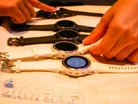Garmin Health partners with the University of Kansas Medical Center

Garmin, a global leader in wearable technology, and the University of Kansas Medical Center, a world-class academic medical research facility, have decided to partner to foster innovation and better understand how wearables can assist in the detection and management of significant medical conditions. Their initial research will focus on sleep apnoea and atrial fibrillation.
The duo is working on multiple research projects, combining high-quality sensor data from Garmin devices, with the health care expertise of KU Medical Center researchers.
“Garmin Health is excited to work with a nationally-recognised institution like KU Medical Center that is on the forefront of digital health research,” explained Scott Burgett, Director of Garmin Health Engineering.
“As patients assume increased responsibility for their own health care, Garmin is committed to the development of wearables that can lead to the prevention or detection of serious health conditions. With long battery life, high water rating, and high-quality sensor data, we can provide meaningful features that will help reduce health care costs and provide useful functionality for everyday life.”
By continuing monitoring those with known conditions, healthcare professionals will gain essential insight and gain the ability to assist in delivering a well-informed course of treatment. KU Medical Center research provides clinically based data that can aid in the development of algorithms capable of identifying conditions such as sleep apnoea and atrial fibrillation.
See also
- GDPR and healthcare - how to ensure a clean bill of health
- Bill Gates revives interest in developing a universal flu vaccine
- Novartis launches new app, built with Apple’s ResearchKit
Sleep apnoea affects up to 18mn US citizens. Consequently, Garmin Health has worked with Suzanne Stevens, M.D., Clinical Assistant Professor of Neurology, and Catherine Siengsukon, Ph.D., Associate Professor of Physical Therapy and Rehabilitation Science, at KU Medical Center to study how wearables equipped with optical sensors could be used to detect sleep apnoea and provide a lower cost alternative to an overnight sleep centre evaluation.
Additionally, atrial fibrillation is the most common cardiac arrhythmia, increasing the risk of stroke by 500% and can cause heart failure. Affecting millions of people in the US, similarly to sleep apnoea, it is cumbersome and costly to detect.
“This research will help us better understand how wearables can do the same while asleep, helping to detect sleep apnoea, which left untreated can affect mood, memory, trigger heart arrhythmias, heart attacks, and even strokes,” commented Dr Stevens.
“Wearable technology capable of early detection and monitoring of heart rhythm disorders will be a revolutionary boon to cardiac care,” said Dr. Madhu Reddy, M.D., Associate Professor of Medicine at KU Medical Center and Division Director, Heart Rhythm Services in the Department of Cardiovascular Medicine at The University of Kansas Health System.
- 'Can't Just Throw AI at Medical Devices' - MedTech ExpertMedical Devices & Pharma
- Abbott Labs' profits soar; Nipro opens First US FacilityMedical Devices & Pharma
- Hologic: How Can Technology be Harnessed to Combat Cancer?Technology & AI
- Signia’s Brian Taylor on audiology & medical devicesMedical Devices & Pharma



